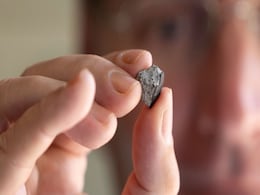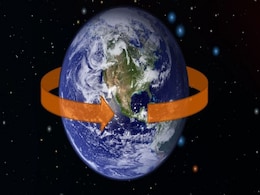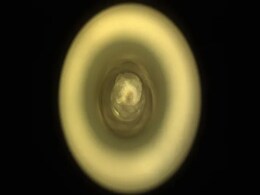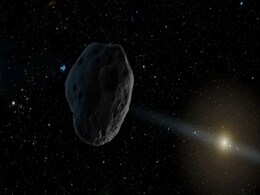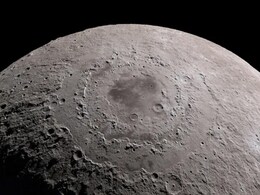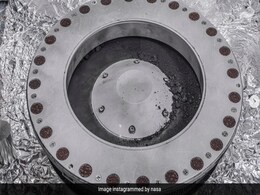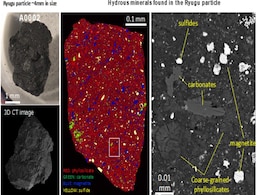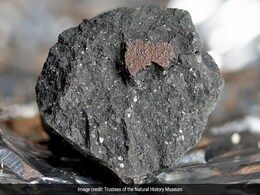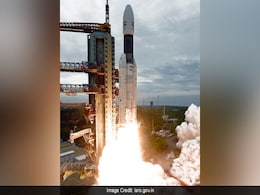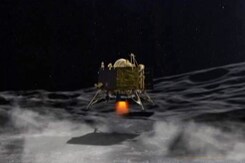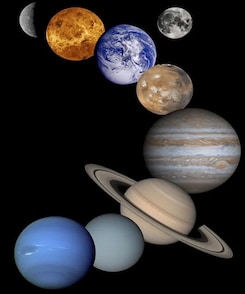Solar System History
- All
- News
- Videos
- Web Stories
-

Cosmic Visitor: 4.56-Billion-Year-Old Meteorite Strikes into Georgia Home
- Thursday August 14, 2025
- Written by Gadgets 360 Staff
On June 26, 2025, a dazzling daytime fireball streaked over Georgia, captured by satellites and witnessed across multiple states. A surviving fragment smashed through the roof of a McDonough home, denting the wooden floor 14 feet below. Scientists at the University of Georgia analyzed about 23 grams of this ancient rock, determining it to be a 4.56...
-
 www.gadgets360.com
www.gadgets360.com
-

Earth to Spin Faster on July 22 to Make It One of the Shortest Days in Recorded History
- Tuesday July 22, 2025
- Written by Gadgets 360 Staff
On Tuesday, July 22, 2025, Earth will complete its rotation 1.34 milliseconds faster than the usual 24 hours, scientists say. That will make it the second-shortest day ever recorded, just behind July 10, 2025. The trend of shorter days has accelerated since 2020, attributed to factors like the Moon’s position, mass shifts from melting ice, and at...
-
 www.gadgets360.com
www.gadgets360.com
-

NASA Perseverance Rover Discovers Ancient Rock Sample on Mars' Jezero Crater
- Monday February 10, 2025
- Written by Gadgets 360 Staff
NASA’s Perseverance rover has collected a unique rock sample from Mars' Jezero Crater. The rock, named “Silver Mountain,” is believed to be one of the oldest in the solar system, possibly dating back to the Noachian period, over 4 billion years ago. This discovery provides new insights into Mars’ geological history and past environmental co...
-
 www.gadgets360.com
www.gadgets360.com
-

Rubin Observatory’s 2025 Debut Could Unveil Hidden Dark Comets in Space
- Thursday January 9, 2025
- Written by Gadgets 360 Staff
The Vera Rubin Observatory, set to begin operations in 2025, is expected to revolutionise the study of dark comets. These elusive objects, which lack visible tails but exhibit non-gravitational acceleration, have already been identified in our solar system, but their true numbers remain unknown. The observatory's advanced technology, including a po...
-
 www.gadgets360.com
www.gadgets360.com
-

New Lunar Map Attempts to Identify the Origin Impact Craters of Rock Samples
- Tuesday November 26, 2024
- Written by Gadgets 360 Staff
A new map of the moon’s Mare Orientale basin highlights areas containing original impact melt. These findings could help date the basin’s formation, which is estimated to be 3.8 billion years old. Scientists believe this research may reveal Earth’s early impact history while guiding future lunar sample-return missions. The map also distinguis...
-
 www.gadgets360.com
www.gadgets360.com
-

James Webb Space Telescope Discoveries Challenge Theories About Asteroid Psyche’s Origin
- Sunday August 18, 2024
- Gadgets 360 Staff
Recent findings from the James Webb Space Telescope (JWST) have introduced new uncertainties about asteroid 16 Psyche. Known for its high iron content, Psyche was previously considered a potential remnant of a protoplanet, providing a valuable opportunity to study the early solar system. However, JWST has detected hydrated minerals on its surface, ...
-
 www.gadgets360.com
www.gadgets360.com
-

Signs Of Extensive Volcanic Activity Discovered On Mars' Elysium Planitia
- Wednesday December 20, 2023
- Science | Edited by Nikhil Pandey
The findings have implications for research surrounding whether Mars could have harbored life at some point in its history, according to the authors.
-
 www.ndtv.com
www.ndtv.com
-

Origins Of Life On Earth: 4.5 Billion-Year-Old Asteroid Holds Clues
- Tuesday November 28, 2023
- Science | Edited by Nikhil Pandey
Scientists are hopeful that fragments from a 4.5-billion-year-old space rock will reveal the origins of our existence.
-
 www.ndtv.com
www.ndtv.com
-

Ancient Space Rocks May Hold Clues To Earth's Formation, Says NASA
- Saturday October 14, 2023
- Science | Edited by Nikhil Pandey
The image shows a canister, which is a gray metal cylinder. Inside, dark, powdery asteroid sample material can be seen.
-
 www.ndtv.com
www.ndtv.com
-

Ryugu Samples Are Most Contaminant-Free Outer Solar System Particles, Says Study
- Tuesday August 16, 2022
- Edited by Gadgets 360 Newsdesk
In an in-depth analysis conducted by a team of Japanese researchers at JAMSTEC (Japan Agency for Marine-Earth Science and Technology), it is found that the Ryugu samples brought on Earth in December 2020 by the Japanese aircraft Hayabusa-2 are the most “uncontaminated” samples. This will help scientists get a crystal-clear insight into the chem...
-
 www.gadgets360.com
www.gadgets360.com
-

NASA’s James Webb Telescope to Help Study Early Cosmic History, Identify Life Outside Our Solar System
- Friday July 15, 2022
- Agence France-Presse
NASA recently revealed stunning images captured by the James Webb Space Telescope (JWST) earlier this week. Now the space agency’s most powerful space telescope will help scientists uncover the mysteries of the universe. Here’s how two projects, one studying the early history of the universe and another looking for life outside our solar system...
-
 www.gadgets360.com
www.gadgets360.com
-

ESA's Mars Express Mission Captures Image of Crater on Red Planet, Shares Uncanny Resemblance to Human Eye
- Monday June 13, 2022
- Edited by Gadgets 360 Newsdesk
European Space Agency's Mars Express mission captured an image of Aonia Terra, a crater-filled region in the Red Planet's southern hemisphere. One of the images shows a crater encircled by winding channels. A closer look would suggest that the image looks eerily like a human eyeball.
-
 www.gadgets360.com
www.gadgets360.com
-

Astonishingly Rare Meteorite That Fell In UK May Contain "Ingredients Of Life"
- Wednesday March 10, 2021
- Offbeat | Written by Sanya Jain
A meteorite that fell on a driveway in the UK has been described as "astonishingly rare" by the Natural History Museum, which says that it could provide answers to questions about the early history of the solar system and life on Earth.
-
 www.ndtv.com
www.ndtv.com
-

"Look Forward To Exploring Solar System Together," NASA Tweets ISRO
- Sunday September 8, 2019
- India News | Edited by Swati Sharma
When India attempted history last night, trying to become the first country to land near the south pole of the Moon, it had the attention of the entire world. Though the Indian Space Research Organisation or ISRO lost contact with Chandrayaan 2's Vikram Lander moments before it could touch down on the Moon, words of encouragement have been flowing ...
-
 www.ndtv.com
www.ndtv.com
-

Cosmic Visitor: 4.56-Billion-Year-Old Meteorite Strikes into Georgia Home
- Thursday August 14, 2025
- Written by Gadgets 360 Staff
On June 26, 2025, a dazzling daytime fireball streaked over Georgia, captured by satellites and witnessed across multiple states. A surviving fragment smashed through the roof of a McDonough home, denting the wooden floor 14 feet below. Scientists at the University of Georgia analyzed about 23 grams of this ancient rock, determining it to be a 4.56...
-
 www.gadgets360.com
www.gadgets360.com
-

Earth to Spin Faster on July 22 to Make It One of the Shortest Days in Recorded History
- Tuesday July 22, 2025
- Written by Gadgets 360 Staff
On Tuesday, July 22, 2025, Earth will complete its rotation 1.34 milliseconds faster than the usual 24 hours, scientists say. That will make it the second-shortest day ever recorded, just behind July 10, 2025. The trend of shorter days has accelerated since 2020, attributed to factors like the Moon’s position, mass shifts from melting ice, and at...
-
 www.gadgets360.com
www.gadgets360.com
-

NASA Perseverance Rover Discovers Ancient Rock Sample on Mars' Jezero Crater
- Monday February 10, 2025
- Written by Gadgets 360 Staff
NASA’s Perseverance rover has collected a unique rock sample from Mars' Jezero Crater. The rock, named “Silver Mountain,” is believed to be one of the oldest in the solar system, possibly dating back to the Noachian period, over 4 billion years ago. This discovery provides new insights into Mars’ geological history and past environmental co...
-
 www.gadgets360.com
www.gadgets360.com
-

Rubin Observatory’s 2025 Debut Could Unveil Hidden Dark Comets in Space
- Thursday January 9, 2025
- Written by Gadgets 360 Staff
The Vera Rubin Observatory, set to begin operations in 2025, is expected to revolutionise the study of dark comets. These elusive objects, which lack visible tails but exhibit non-gravitational acceleration, have already been identified in our solar system, but their true numbers remain unknown. The observatory's advanced technology, including a po...
-
 www.gadgets360.com
www.gadgets360.com
-

New Lunar Map Attempts to Identify the Origin Impact Craters of Rock Samples
- Tuesday November 26, 2024
- Written by Gadgets 360 Staff
A new map of the moon’s Mare Orientale basin highlights areas containing original impact melt. These findings could help date the basin’s formation, which is estimated to be 3.8 billion years old. Scientists believe this research may reveal Earth’s early impact history while guiding future lunar sample-return missions. The map also distinguis...
-
 www.gadgets360.com
www.gadgets360.com
-

James Webb Space Telescope Discoveries Challenge Theories About Asteroid Psyche’s Origin
- Sunday August 18, 2024
- Gadgets 360 Staff
Recent findings from the James Webb Space Telescope (JWST) have introduced new uncertainties about asteroid 16 Psyche. Known for its high iron content, Psyche was previously considered a potential remnant of a protoplanet, providing a valuable opportunity to study the early solar system. However, JWST has detected hydrated minerals on its surface, ...
-
 www.gadgets360.com
www.gadgets360.com
-

Signs Of Extensive Volcanic Activity Discovered On Mars' Elysium Planitia
- Wednesday December 20, 2023
- Science | Edited by Nikhil Pandey
The findings have implications for research surrounding whether Mars could have harbored life at some point in its history, according to the authors.
-
 www.ndtv.com
www.ndtv.com
-

Origins Of Life On Earth: 4.5 Billion-Year-Old Asteroid Holds Clues
- Tuesday November 28, 2023
- Science | Edited by Nikhil Pandey
Scientists are hopeful that fragments from a 4.5-billion-year-old space rock will reveal the origins of our existence.
-
 www.ndtv.com
www.ndtv.com
-

Ancient Space Rocks May Hold Clues To Earth's Formation, Says NASA
- Saturday October 14, 2023
- Science | Edited by Nikhil Pandey
The image shows a canister, which is a gray metal cylinder. Inside, dark, powdery asteroid sample material can be seen.
-
 www.ndtv.com
www.ndtv.com
-

Ryugu Samples Are Most Contaminant-Free Outer Solar System Particles, Says Study
- Tuesday August 16, 2022
- Edited by Gadgets 360 Newsdesk
In an in-depth analysis conducted by a team of Japanese researchers at JAMSTEC (Japan Agency for Marine-Earth Science and Technology), it is found that the Ryugu samples brought on Earth in December 2020 by the Japanese aircraft Hayabusa-2 are the most “uncontaminated” samples. This will help scientists get a crystal-clear insight into the chem...
-
 www.gadgets360.com
www.gadgets360.com
-

NASA’s James Webb Telescope to Help Study Early Cosmic History, Identify Life Outside Our Solar System
- Friday July 15, 2022
- Agence France-Presse
NASA recently revealed stunning images captured by the James Webb Space Telescope (JWST) earlier this week. Now the space agency’s most powerful space telescope will help scientists uncover the mysteries of the universe. Here’s how two projects, one studying the early history of the universe and another looking for life outside our solar system...
-
 www.gadgets360.com
www.gadgets360.com
-

ESA's Mars Express Mission Captures Image of Crater on Red Planet, Shares Uncanny Resemblance to Human Eye
- Monday June 13, 2022
- Edited by Gadgets 360 Newsdesk
European Space Agency's Mars Express mission captured an image of Aonia Terra, a crater-filled region in the Red Planet's southern hemisphere. One of the images shows a crater encircled by winding channels. A closer look would suggest that the image looks eerily like a human eyeball.
-
 www.gadgets360.com
www.gadgets360.com
-

Astonishingly Rare Meteorite That Fell In UK May Contain "Ingredients Of Life"
- Wednesday March 10, 2021
- Offbeat | Written by Sanya Jain
A meteorite that fell on a driveway in the UK has been described as "astonishingly rare" by the Natural History Museum, which says that it could provide answers to questions about the early history of the solar system and life on Earth.
-
 www.ndtv.com
www.ndtv.com
-

"Look Forward To Exploring Solar System Together," NASA Tweets ISRO
- Sunday September 8, 2019
- India News | Edited by Swati Sharma
When India attempted history last night, trying to become the first country to land near the south pole of the Moon, it had the attention of the entire world. Though the Indian Space Research Organisation or ISRO lost contact with Chandrayaan 2's Vikram Lander moments before it could touch down on the Moon, words of encouragement have been flowing ...
-
 www.ndtv.com
www.ndtv.com

